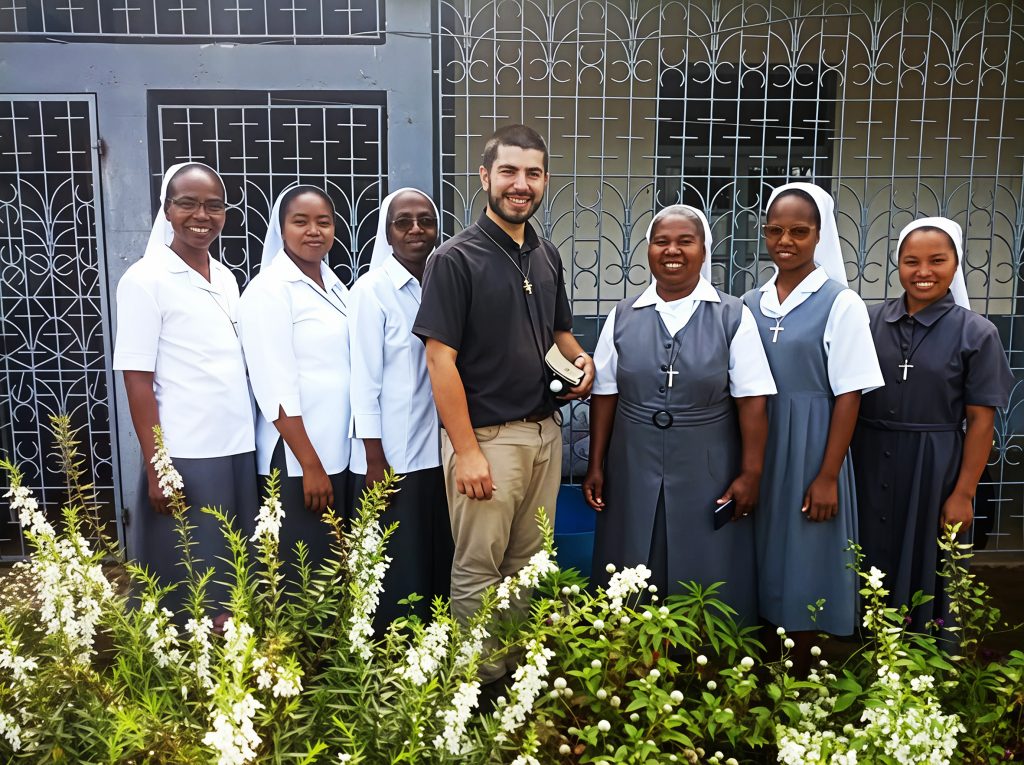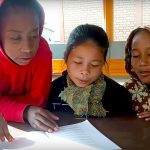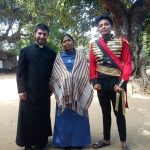
P. Jérémy Fravrelière, MEP et les Soeurs de la Sagesse, Madagascar
During my Holy Week tour, I met a girl in a village about six hours’ walk from the nearest road. To start the conversation, I asked her what she was doing in life: whether she was studying or already working. The girl must have been about the age of first or second grade, about 16 or 17. She replied proudly, ‘I’m studying; I’m in third grade.’ Her middle school is a two-hour walk away. I asked her how many young people were in her class. She told me there were fourteen. How many of them were girls? Only three. Once again, I became aware how little access there is to education in Madagascar – even though it’s compulsory – and how much less access there is for girls. This young girl then confided in me some of her dreams, and for those she wanted to go to high school. The high school is located where we join the road, which means a six-hour walk. It’s not possible to do a round trip in a day, so students have to be accommodated on site, which is complicated and increases the costs of education. Boarding schools on the island are almost non-existent and, in some regions, there are none at all.
On another trip, I met another middle school student. I asked her how old she was. ‘12’, she replied. Since it was a good hour’s walk from the nearest middle school, I asked her if she made the journey every day. She said no, but explained that her parents had found her a place to stay. I then asked her if she lived alone, expecting her to tell me she was staying with a family friend. As expected, she replied that she didn’t live alone. And then, unexpectedly, she explained ‘No, I live alone with my little sister’. Here we have a 12-year-old who is responsible for running a home, for her own studies, for the preparation of meals, the shopping, etc.
These two stories made me stop and think, and to reflect, with our readers, on the overall situation of women in Madagascar.
A central place in society
In Madagascar, women play a central rôle in society, as guardians of tradition, as economic actors, as agents of social transformation, and as promoters of faith. However, they face numerous structural and cultural challenges that limit their full participation in public and economic life. This article provides a summary of the many roles that Malagasy women play, drawing on recent data as well as field studies.
Guardians of tradition and economic actors
In rural communities, women are the backbone of the family economy. They cultivate the land, sell produce in local markets, and manage family budgets. Despite their vital role, women’s access to land ownership remains limited: only 15% of arable land is legally owned by women, compared to 52% by men[1]. Women are also the custodians of artisanal skills and cultural traditions. They maintain practices such as the masonjoany, a traditional beauty mask, and play a central role in rites of passage and family ceremonies[2]. A colleague explained to me that, in his ecclesiastical region, there are traditional kings. There is one person who is more important than the king, and that is the king’s sister.
Challenges in education and health
Access to education remains a major challenge for Malagasy girls. Only 30.8% of girls aged 11 to 17 attend secondary school. Early marriage and pregnancy, domestic chores, and gender-based violence at school are all factors that hinder their educational progress[3].
As far as health is concerned, women face barriers in accessing maternal, sexual and reproductive health services. The low proportion of births attended by professionals (45.8%) and the high unmet need for contraception (14.6%) illustrate these challenges[4].
I would like to pay tribute to the important work done by the nuns who are involved in developing education and health services. Next to the catechism centre where I live there is a dispensary run by the Daughters of Wisdom. They do extraordinary work in providing healthcare. It is the only real source of healthcare provision for miles around. Despite their efforts, when sick patients arrive, it is often too late. How many women die in childbirth? How many succumb quickly to postpartum illnesses or infections? Also, how many young lives are taken by bilharzia, malaria, or tuberculosis? The plague still exists in Madagascar.
Women’s leadership and political participation
Women’s representation in political bodies remains low. In 2021, women held 17% of seats in the National Assembly and 11% in the Senate. A law adopted in May 2022 aims to ensure equal representation in appointed positions and to promote gender parity in elected office[5].
In 2014, and again from 2019 to 2024, Christine Harijaona Razanamahasoa served twice as President of the National Assembly of Madagascar.
Initiatives such as the capacity-building workshops for women leaders organized by the United Nations Development Programme (UNDP) aim to promote social cohesion and conflict prevention, particularly during election periods[6].
Towards economic empowerment
Development projects, such as those implemented in the Great South of Madagascar, seek to strengthen economic empowerment of women. By supporting women’s activities, these initiatives enable some of them to increase their incomes and improve the living conditions of their families[7].
Promoters of faith
In Madagascar, women play a vital role in Church life.
In the Catholic Church, figures such as Victoire Rasoamanarivo (1848-1894), beatified in 1989, exemplify the commitment of women. She enabled the blossoming of the Catholic faith in Madagascar by organizing the Church, structuring educational institutions, visiting communities, and caring for lepers, among other things. She supported the faithful, particularly during times of persecution. She played a crucial role in keeping the faith alive in Madagascar when the missionaries were expelled. She is truly a leading figure in the birth of the Catholic Church in Madagascar.
Women in the Catholic Church in Madagascar are at the forefront of synodal practices[8]. Their role is often, unfortunately, hidden or, one might say more politely, too discreet. However, there are many women catechists, who take on the responsibility of leading prayer in bush churches, as well as transmitting and providing education in the faith.
In Protestant churches, particularly in the Malagasy Lutheran Church (FLM), women are very active in women’s associations, such as the Fikambanam-behivavy Loterana (FBL). They participate in educational, health, and social activities, although access to pastoral positions generally remains reserved for men.
Malagasy women play a vital role in society. There is undoubtedly still a long way to go. Pregnancies, many of them far too early, or the lack of healthcare, linked to the limited resources allocated to girls’ education, remain a major challenge. The lack of places for education and healthcare are also problematic. We also need to talk about the problems of violence or rape that women suffer, or the great taboo of incest. Almost no one dares to talk about it, but it is there, right before our eyes. Fortunately, people are getting involved and making their voices heard. In closing, I recommend a song by a great artist from Tamatave: Denise. In her song Zonay Vehivavy, which translates as ‘Our Rights as Women’, the Malagasy singer addresses themes related to women’s rights, particularly sexual violence and incest. The song highlights the suffering that some women endure in silence, including abuse committed within the family circle. We can only praise her courage. Things are moving forward.
Fr Jérémy Favrelière, MEP
[1] https://www.afrobarometer.org/publication/ad767-les-malgaches-et-le-genre-des-inegalites-subsistent-plus-defforts-sont-demandes/
[2] https://www.lebloginfo.fr/femme-de-madagascar-traditions-et-modernite-dans-la-societe-malgache/
[3] https://www.banquemondiale.org/fr/country/madagascar/publication/madagascar-afe-gender-assessment
[4] https://www.banquemondiale.org/fr/country/madagascar/publication/madagascar-afe-gender-assessment
[5] https://assemblee-nationale.mg/adoption-de-la-proposition-de-loi-sur-la-participation-des-femmes-aux-postes-de-decision/
[7] https://gender-works.giz.de/competitions/madagascar-resilience-par-chaines-de-valeur/
[8] https://www.aciafrique.org/news/7418/les-femmes-deja-a-lavant-garde-des-pratiques-synodales-leader-jesuite-en-afrique-et-madagascar
- Fillettes à l’ecole, Madagascar
- Le père Jérémy Fravrelière, MEP a participé au tournage du du film Rasoamanarivo Victoire, retraçant la vie de la bienheureuse. Il jouait le rôle du P. Weber. Projet malgache, en malgache, pour les malgaches
- Le père Jérémy Fravrelière, MEP a participé au tournage du du film Rasoamanarivo Victoire, retraçant la vie de la bienheureuse. Il jouait le rôle du P. Weber. Projet malgache, en malgache, pour les malgaches
- Affiche du film sur Victoire, la Beinheureuse sainte de Madagascar
- P. Jérémy Fravrelière, MEP et les Soeurs de la Sagesse, Madagascar




